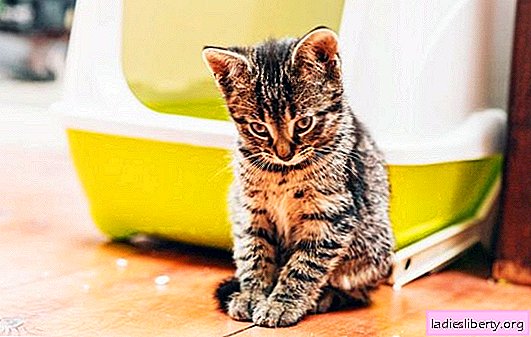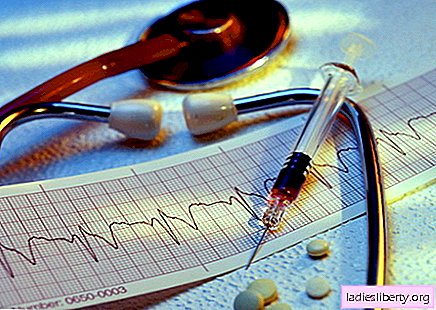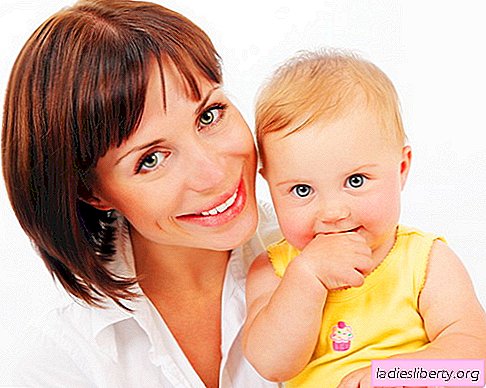
The suffering of a beloved pet causes their owners very unpleasant experiences. Especially when it is not clear why the cat suddenly became lethargic, her appetite disappeared and diarrhea appeared. What to do if a cat has diarrhea?
How to diagnose cat diarrhea
Diarrhea in cats is not a disease, but a symptom that is caused by various pathological conditions. Not only humans, but also cats can suffer from diarrhea. Diarrhea syndromes are frequent urge to the toilet, loose stools in less quantity than usual. The color of feces can vary from black to dark red, if there is an impurity of blood. Diarrhea is usually accompanied by nausea, vomiting, abdominal cramps, bloating, which ultimately causes severe dehydration, as well as severe stress for the animal. Therefore, it is very important to immediately begin the correct treatment as soon as the first signs of indigestion appear.
Causes of Cat Diarrhea
There are many causes of diarrhea in cats, especially in inexperienced owners. Do not worry if diarrhea appears in a kitten. Fluid stool in kittens is characteristic of the immaturity of the gastrointestinal tract. Under normal health conditions in a cat, bowel movements occur 1-2 times a day, feces are clearly formed, soft and moist. If the feces become excessively wet, mushy, watery and frequent, then these are manifestations of diarrhea. If diarrhea appeared in an adult cat, then the following reasons should be considered.
Incorrectly selected food or a sharp change in feeding. This is the most common cause of feline stomach problems. But it happens that the owner is forced to change the brand of feed or even switch from dry feed to natural food. Also, the reason may be feeding the cat with food or canned economy class;
Diarrhea may appear on the background of an allergy to any drug. Most often these are medicines for worms, shampoos and flea collars, aerosols for ticks. A problem may also arise after the routine vaccination;
Worms. Parasites secrete toxic substances when located on the mucous membranes of the stomach. These substances provoke diarrhea in cats;
Viral and bacterial infections. For these reasons, fever, vomiting, and general depression are characteristic;
Stress. When moving, with other concomitant diseases, when going to the hospital, when animals attack or abuse the animal, diarrhea can occur. So the cat's body reacts to various external stimuli;
Poisoning by spoiled food or missing products;
The ingestion of a foreign body into the intestines of an animal. With the help of diarrhea, the cat's body tries to remove a foreign object from the intestine;
Serious illness. Such as pancreatitis, renal failure, liver disease, diabetes, cancer.
Diagnosis of diarrhea at home
At home, diarrhea can be diagnosed with diarrhea by the color of feces.
Yellow diarrhea is usually not harmful to a cat’s health status. This usually occurs with poor digestion of food. Dangerous is feces of orange color, this is typical for liver damage or an excess of bilirubin;
Swamp diarrhea is characteristic of putrefactive courses in the gastrointestinal tract. It is likely that the cat ate a rotten product;
White color indicates problems with the gallbladder, clogging of the bile ducts;
Diarrhea, consisting practically of water, indicates problems with the intestines without damaging the mucous membrane;
Diarrhea from milk is normal for a cat;
Diarrhea and vomiting is characteristic of food poisoning;
Diarrhea with blood requires immediate contact with a veterinarian, as it indicates a serious illness;
Mucous diarrhea is characteristic for inflammation of the large intestine;
First aid for diarrhea in a cat. What can be done?
Before starting treatment, try to remember what was the last time the animal was fed. If it was milk, fresh fish or pork, then in this case, treatment is not required. It is necessary to water the cat with clean water through a syringe to prevent dehydration, and do not give these products anymore.
If diarrhea occurs after switching from an old feed to a new one, for example, in a kitten, then you just have to wait a bit or reduce the number of feedings.
When none of the above methods is suitable for your cat, and in addition to diarrhea, she also has vomiting, fever and loss of appetite, you need to resort to medications. The animal needs to be given one tablet of activated charcoal per 10 kg of weight, remove all food for a day and provide a large amount of fresh water to prevent dehydration.
Crush the tablet with a spoon, mix with water and drink this mixture of your pet with a syringe.
After temporary fasting, the cat needs to be fed gradually increasing the dose of feed, preferably for sensitive digestion.
If there is no possibility to see a doctor, and the cat’s diarrhea is black and fetid, you can give an antibiotic such as Trichopolum in a dose of 15-25 mg per 1 kg of weight, the daily dose should be divided into 2 times.
In any case, there is no need to engage in self-medication without an emergency and in the very near future it is necessary to contact a veterinary clinic.
Cat diarrhea treatment
If the cat’s diarrhea lasts longer than a day and there are no visible improvements, then you should contact your veterinarian. In the clinic, to make the correct diagnosis, the cat will be tested:
feces on worm eggs;
research on hidden bleeding;
urine and blood tests;
perhaps an x-ray or ultrasound scan will be done to clarify the diagnosis of pancreatitis, as well as the entry of a foreign body into the cat's body.
If worms are detected, anthelminthic therapy will be prescribed. If there is an intestinal infection, the veterinarian will prescribe antibacterial treatment. And to restore the loss of fluid to the cat, a dropper with glucose, ascorbic acid and sodium chloride will be delivered.
Prevention of diarrhea
In order to avoid an unpleasant surprise in the form of diarrhea in a cat, you can take a number of necessary measures. Such measures include preventive treatment for parasites, taking antihistamines before scheduled vaccinations, controlling the freshness of natural foods, as well as the correct selection of dry food. For a cat, constant access to fresh water, as well as a lack of access to medicines, is important. When playing with small objects, you need to make sure that the cat can not swallow them. Care should be taken to the filler in the tray, there have been cases when a cat was etched with granules from a cat's pot.
Now, if suddenly your cat begins diarrhea, you will know what to do. The main thing to understand is that a serious illness can be hidden behind the problem of indigestion, so do not self-medicate and consult a competent specialist. Feed your pet fresh food and high-quality food, and then your cat will not face digestive problems.











